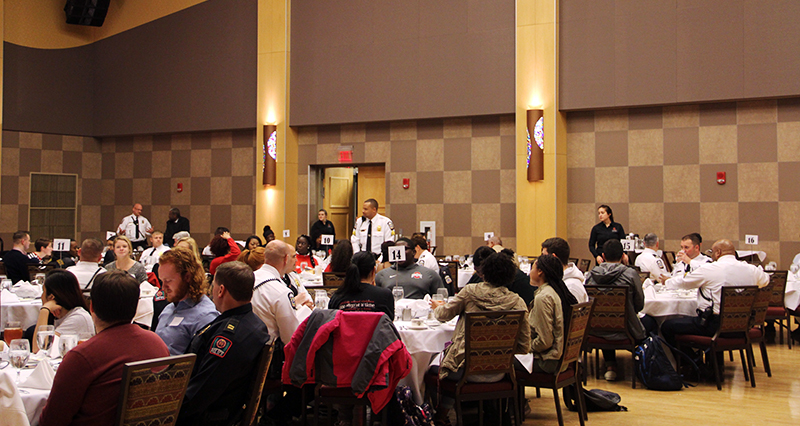
The audience at the Sustained Dialogue event, Rights, Relations and Responsibilites at the Ohio Union on March 31st.
The event Rights, Responsibilities and Relations brought together Ohio State and Columbus police officers and members of the OSU community to hold a dialogue about policing, race and safety.
Sustained Dialogue at OSU hosted the open-dialogue dinner on Thursday, along with OSU’s Black Student Association and the Undergraduate Student Government.
Sustained Dialogue chapter president Stephen Post said he realized back in the fall that they should address issues of police and safety because it is a topic on people’s minds. The organization seeks social change and to build relationships through different people sharing their thoughts and opinions in an open-dialogue situation.
“I hoped that this event would provide a safe space for students and Columbus-area law enforcement to have the opportunity to engage in thoughtful, meaningful discussions about how to improve their relationship,” Rhiana Shabazz, a fourth-year in health information management and systems and vice president of the Black Student Association, said in a an email. “We want the students at Ohio State to see law enforcement as their supporter, not an enemy. We also want students to feel safe on campus. We were hoping this program would serve as the beginning phase for bridging that gap.”
The event combined dinner with casual conversation about police-enforcement issues and concerns. Tables were comprised of police officers, sustained dialogue moderators, students, faculty, staff and administrators.
“To be able to share these things and truly kind of reduce the tension, reduce the conflict, reduce anything that’s even just sitting there. We might not even realize on a day-to-day basis that we think about these things and have some of these predispositions,” Post said. “Just kind of bringing those out and talking about some of these things I think really gives people a sense of where they’re at with a situation and gives them a little bit more knowledge as well … I really want this to be a first step and not a last step.”
Post, a second-year in political science and economics, said that Sustained Dialogue meets every week for an open dialogue.
“So you get to really know the people that you’re having these dialogues with,” he said. “You really get to know their experiences, their identities, and we talk about different social identities, any issues that are pertinent at the time.”
Hannah McCandless, a fourth-year in international studies, said the group is a “relationship-based tool for social change.”
“It’s about creating social change by creating change in ourselves first,” she said. “You’re in a room with people that you don’t know and that are different and you’re talking and you’re sharing and through that the goal is to be changed by what you hear which is something we talk about a lot. To listen deeply enough that you’re changed by what you hear.”
Post said Sustained Dialogue covers different types of issues, such as social identities or race, and also hosts dialogues between contentious parties when two different groups are unable to talk to one another in order to bring them together.
McCandless said Post got the idea for Rights, Responsibilities and Relations after the shooting of an unarmed black male by a police officer in Cincinnati, and the group discussed the incident at its first meeting in the fall.
McCandless recalled Post saying that a similar situation could arise in Columbus, so people should be proactive, and that he wanted to have a dialogue with police officers and OSU students, and talk about race
Vice President of Student Life Javaune Adams-Gaston spoke to the audience at the event, along with the Columbus Chief of Police Kim Jacobs and the keynote speaker, Terrell Strayhorn.
Capt. Eric Whiteside, who works for University Police, attended the event as well.
“I was hoping for a dialogue … I think we accomplished that. I like to go to these events to listen, to hear what’s being said,” Whiteside said. “I think it’s really important to get feedback from the community that we serve and hear about how we’re doing and their situations when they interact with our department and other agencies, listen to what kind of questions they might have, provide feedback and just have a good, honest discussion, and I think that was accomplished.”
Whiteside said that he learned a lot from the different stories and feedback from the group of people at his table.
“Anytime we have an opportunity to sit down and talk about what we do and how we do it and to hear people, hear how we’re doing, obviously we’re here to serve our community and we want to make sure that we’re doing it in a way that has their respect and support,” Whiteside said. “As an agency, I think we found a lot of value in this and I think anytime we can seek out an opportunity to do something similar, we’re gonna do that.”
Shabazz said the event changed the way she thinks about police, and that BSA, Sustained Dialogue and police are open to a follow-up event.
“A lot of the police officers were a lot friendlier and outgoing (than) I anticipated … I have a completely new opinion and a different respect level for the Columbus and OSU PD after taking the time to get to know them,” she said.
Post said the group hopes that now that students, faculty and staff have had the chance to converse with different members of law enforcement, they will be able to look at situations in a different way and share what they have learned.
“I hope that people will take those perspectives and those ideas and share them, bring them up in conversations when you do hear someone say a comment or something about it,” Post said. “These people have participated in a dialogue, they’ve had these conversations, they’ve talked about it before, so now they’re knowledgeable on the topic and will spread those perspectives around.”


